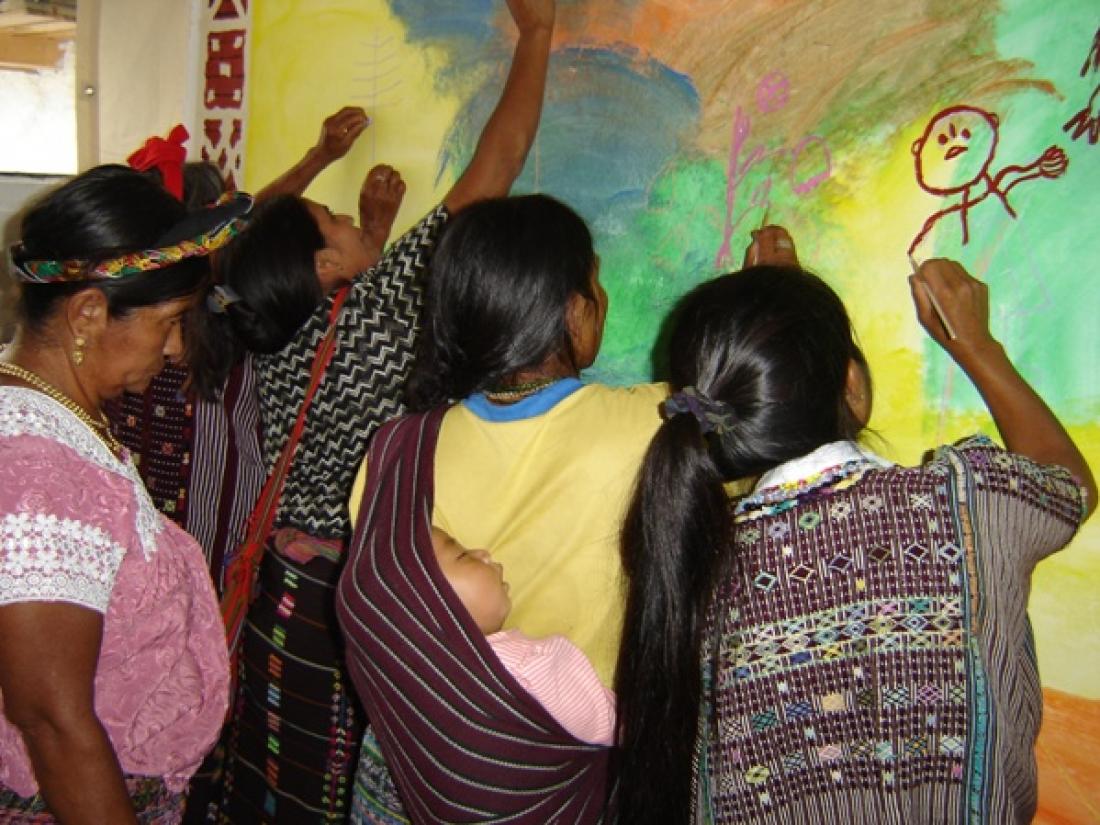This question was at the heart of a seminar that brought researchers from Guatemala and Colombia to IDRC head office in Ottawa. They spoke of three initiatives attempting to preserve the “historical memory” of women involved in conflict.
Searching for healing and justice
The researchers’ hope is that breaking the silence that surrounds women’s experience of war will free them from the bonds of the past and allow them to start rebuilding their lives.
Public acknowledgement is also central to challenging the impunity of the perpetrators of past crimes. The ultimate aim, remarks Judith Erazo, director of Guatemala’s Community Study and Psycho-Social Action Team (ECAP), is “to ensure that the atrocities that happened will never happen again.”
Guatemala: a calculated campaign of terror
Guatemala’s recent history provides a somber testament to the dangers that women face during civil conflicts. Amnesty International estimates 200,000 people were subjected to enforced disappearances or were were killed in the war. Witnesses have reported that massacres occurring after 1981 were accompanied by mass rapes of women.
Erazo insists that all this was not incidental to the country’s armed conflict but “part of a policy of terror… a systematic modus operandi.”
Planning documents like those for the “Victory 82” campaign, for example, show that military authorities encouraged sexual violence as a battlefield tactic.
Victimizing Mayan women was also part of a deliberate strategy “to destroy the biological, social, and cultural continuity of the Maya communities through women,” says Erazo.
How to repair the damage
Judith Erazo sees public recognition of wartime crimes against women—and especially awarding reparations to victims—as crucial steps in helping survivors “go from being victims to being the main players in their own lives.”
Beyond its material support to victims, such reparations would also provide “an opportunity to change the relationship of the state with its citizens” and signal a new respect for human rights, she says.
In fact, “reparations” means more than just financial compensation for victims.
In Guatemala and Colombia, advocates speak of “integral reparations” that provide a symbolic recognition of past injustices and affirm the dignity of those who suffered—particularly those from targeted minority communities.
The underlying goal is to empower former victims by giving them a political voice and a recognized standing in society. This approach holds that such political empowerment is crucially linked to victim’s healing processes.
The past will live on — but how?
Today, the legacy of Guatemala’s past horrors remains. Fear haunts the survivors, says Erazo, and a widespread cultural stigma around sexual violence prevents them from talking about their experiences. Violence against women has also infected civilian life, with killings of women having risen dramatically after the 1996 peace accord. In 2009, Guatemala had the highest number of murdered women in Latin America and the Caribbean.
A face-to-face approach in Colombia
Colombia is also wrestling with questions of how to acknowledge a violent past so as to move beyond it.
Just how difficult this process will be is made clear in the documentary film From Far Away Shores, a 57-minute presentation distilled from 160 hours of interviews with women who were involved in Colombia’s civil war. Its creators—three researchers from the University of Antioquia—chose film as their medium because “we had to give these women a face,” remarks researcher Luz Maria Loñdono.
A complex range of roles for women
The filmmakers talk to women who joined paramilitary and guerilla groups as a quick route out of grinding poverty, but who now find themselves outcast from society. They spoke to indigenous and Afro-descendent women whose villages were destroyed—with sexual violence (intended—as it was in Guatemala—to destroy indigenous culture) routinely accompanying the destruction.
More hopefully, the film listens to different women describing what the word “peace” suggests for their futures.
“We believe that it’s important to give space for the emotions that have been discarded from the political science discourse, because emotions can also be a source of knowledge. We had to look for other ways of talking about the war, because it’s a story we have become too familiar with.” [Luz Maria Loñdono, University of Antioquia, on why her research team chose to make a film, in addition to writing a report.]
Old issues unresolved
A separate project, operating on the northern coast of Colombia—where land seizures and coerced sales have been driving peasants off their lands since the 1970s—underscores the need to resolve old issues in order to work toward that peace.
The National Commission of Reparations and Reconciliation has been gathering testimony from displaced people about how they lost their land and where they used to live—partly with a view to overturning these seizures.
This work is vital to the national interest, says Donny Meertens, a university professor now working for the Commission, since a chief goal of these land seizures was to undermine the country’s land reform program. Since land reform remains crucial to reducing the drastic economic inequality that’s fueled Colombia’s civil conflicts, defending those reforms increases the prospects for peace.
Women start to make decisions
Women have played an important part in this story—in the past largely as victims (as described by Donny Meertens in an audio clip accessible below) but increasingly as agents for change.
“Today,” she says, focusing on the good news in a mostly disheartening story, “we see that there is a process of empowerment for women.”
Stephen Dale is an Ottawa-based writer.



